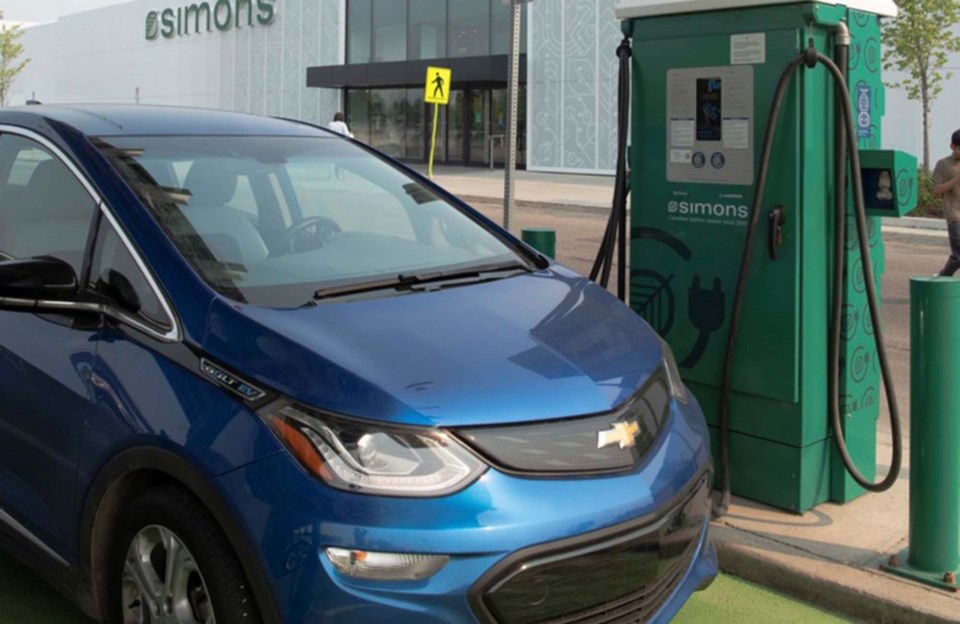Electric vehicle (EV) ownership is still relatively novel in Alberta, but the federal government is funding a number of initiatives to educate anyone interested in switching to a zero-emission vehicle.
On Feb. 15, Eco Canada hosted the third and final webinar in a series on the Canadian EV landscape. The webinar looked at policies and targets surrounding EV ownership in Canada.
The webinars were developed and presented by the Municipal Climate Change Action Center on behalf of Eco Canada and were funded with support from Natural Resources Canada's Zero Emission Vehicle Awareness Initiative
Calvin Lechelt program manager of Alberta Municipalities and Municipal Climate Change Action Centre spoke on seven key topics including current transportation emissions in Canada, the pillars of EV uptake, national and provincial EV policy, government and manufacturer targets, incentive programs in Canada, and benefits to transitioning to EV.
Climate Change Canada has determined 24 per cent of Canada’s emissions come from the transportation sector, said Lechelt.
“Making it the second highest emitting sector in the country after oil and gas,” he said. “Tackling transportation emissions is a significant challenge.”
Canada has a goal of net-zero emission targets and to reach that a variety of solutions are needed, Lechelt said, and include broad electrification of transportation, passenger and freight transportation, expanded public transit, and active transportation increased urban density.
Lechelt said EVs are not perfect in every application and there are other sustainable transportation modes, but the focus of the webinar is on the electrification of passenger cars, SUVs and light trucks, “which make up roughly half of Canada's transportation-related emissions.”
EVs are more efficient than internal combustion engine vehicles, said Lechelt, and will result in emission reductions regardless of where and how a province gets their electricity.
“In provinces with more carbon-intensive electricity grids like Alberta, Saskatchewan and some of the Maritime Provinces, EVS still reduce emissions,” he said. “Luckily, upstream emissions from electricity generation in these provinces is not static and will decrease as more renewable energy, energy storage, energy efficiency and carbon captured capacity is rolled out.”
For EV uptake to increase across Canada, Lechelt identified some key factors that act as a barrier, including cost of the vehicles themselves, battery-related supply chain issues, the current supply of EVs in Canada, and charging infrastructure.
“There are certainly still gaps that can move delay and suppress demand for EVs. Lack of access to charging infrastructure will certainly impact uptake targets,” he said.
Policy is another important factor in the uptake of EVs.
The federal government has a 2035 light duty vehicle target of 100 per cent of new vehicle sales need to be net-zero vehicles.
“Sales mandate will be paired with a credit compliance system for automakers and is scheduled to come into effect in 2026,” Lechelt said.
As for whether Canada is on track to reach new vehicle sales targets, Lechelt said in quarter three of 2022 there were just over 70,000 battery electric vehicles registered in Canada, representing around 6.1 per cent of all registrations. The number did not include hybrid vehicles.
Lechelt said manufacturers also have EV selling targets that range from 40 per cent to 100 per cent of new vehicle sales being EVs by 2035.
Currently, there are funding opportunities from the federal government for purchasing a light duty EV.
“The incentives for Zero Emission Vehicles program will either have a point-of-sale rebate at the dealership, it does not require an application or funding agreement to get started and specifically for light duty passenger vehicles with rebates up to $5,000 per vehicle,” he said.
More information and recordings of the web series can be found at eco.ca



